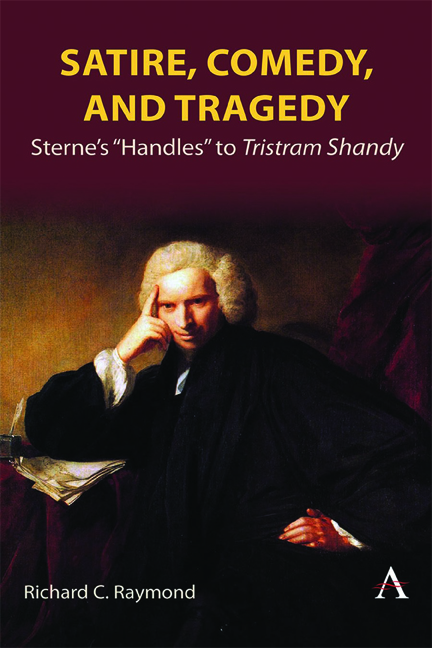Book contents
- Frontmatter
- Contents
- Preface
- 1 Walter, Toby, Tristram, and the Reader: Sterne’s Revision of “Dullness”
- 2 The Yorick Standard, Walter’s Benevolent Dullness, and Tristram’s Friends: The Plot of Satire in Tristram Shandy
- 3 “True Shandeism”: The Unhappy Comic Action in Tristram Shandy
- 4 Isolation and Death: The Tragic Undertones of Shandean Benevolent Dullness
- 5 Benevolent Dullness, Ambiguity, and the Reader: Modal Complexity and the Plots of Tristram Shandy
- 6 Laurence Sterne’s Letters
- 7 The Shandean Sermons of Parson Sterne
- 8 Parson Yorick in A Sentimental Journey and in A Continuation of Bramine’s Journal
- 9 The International Perspective on Tristram Shandy and the Argument
- References
- Index
7 - The Shandean Sermons of Parson Sterne
Published online by Cambridge University Press: 01 March 2024
- Frontmatter
- Contents
- Preface
- 1 Walter, Toby, Tristram, and the Reader: Sterne’s Revision of “Dullness”
- 2 The Yorick Standard, Walter’s Benevolent Dullness, and Tristram’s Friends: The Plot of Satire in Tristram Shandy
- 3 “True Shandeism”: The Unhappy Comic Action in Tristram Shandy
- 4 Isolation and Death: The Tragic Undertones of Shandean Benevolent Dullness
- 5 Benevolent Dullness, Ambiguity, and the Reader: Modal Complexity and the Plots of Tristram Shandy
- 6 Laurence Sterne’s Letters
- 7 The Shandean Sermons of Parson Sterne
- 8 Parson Yorick in A Sentimental Journey and in A Continuation of Bramine’s Journal
- 9 The International Perspective on Tristram Shandy and the Argument
- References
- Index
Summary
In his scholarly Notes to the Sermons, the fifth volume of The Florida Edition of the Works of Laurence Sterne, Melvyn New rightly challenges the “notion” that “we can find a mirror in Sterne's Sermons of the popular conception of the Shandean author” (17), for Sterne wrote and preached as an Anglican clergyman aiming to convey a Christian message, not to reveal his own life (21). Yet, this autobiographical disclaimer notwithstanding, we have found in our analysis of Tristram Shandy Sterne's standard of humble benevolence in Parson Yorick; we have found self-inflating and self-defeating dullness in characters like Phutatorius; we have found the paradox of benevolent dullness in the Shandys; and throughout we have found Tristram and Sterne's intent to draw readers toward Yorick by drawing them first into the laughing world of the Shandys. These same discoveries of character and authorial intent, if not authorial identity, can be made in Sterne's sermons.
Sermons on “Kindred Virtues” and the Folly of Dullness
In the preface to Marjorie David's edition of The Sermons of Mr. Yorick,2 for instance, Sterne underlines Yorick's call for charity guided by religion, a call found in the “Abuses of Conscience” sermon delivered by Trim in Tristram Shandy (2: 139–67).3 His sermons, writes Sterne (Preface: 2), will illustrate “philanthropy, and those kindred virtues to it, upon which hang all the laws of the prophets.” In his sermon titled “Inquiry After Happiness,” Sterne expands on Psalm IV, 5–6, in a Johnsonian manner, surveying vain searches for happiness in pomp and sensuality to conclude that all such “experiments” lead to disappointment and the “perplexed state” of dullness (1: 5). One can escape this defeated state, writes Sterne, only through “the joy and satisfaction of living in the true faith and fear of Thee” (1: 5). Such faith, explains Sterne in “The Case of Hezekiah and the Messenger,” demands that a human being live, as we have found that Yorick lives in Tristram Shandy, with “open and generous integrity”; one must say “the thing he thinks” and do “the thing he pretends,” not like wealthy Hezekiah, who takes credit for the gifts of God (17: 164).
- Type
- Chapter
- Information
- Satire, Comedy and TragedySterne's 'Handles' to <i>Tristram Shandy</i>, pp. 125 - 132Publisher: Anthem PressPrint publication year: 2023



